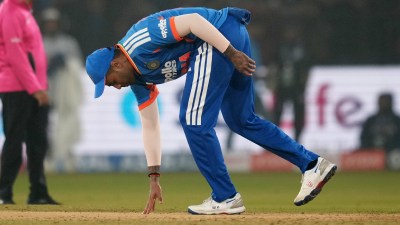Crucial Tuesday: It146;s make or break time for Clinton
Sixtytwo-Year-Old retired school teacher John McLaughlin had an early breakfast on Tuesday morning to reach the Travis High School at Oltorf in Austin.

Sixtytwo-Year-Old retired school teacher John McLaughlin had an early breakfast on Tuesday morning to reach the Travis High School at Oltorf in Austin. It was a 8220;big day8221; for him as also for many others in the states of Texas, Ohio, Rhode Island and Vermont who were to play a decisive role in what is considered as a do-or-die battle for Hillary Clinton in her bid for Democratic Presidential nomination.
While election officials at the Democratic Party8217;s desk at the polling booth in the High School were busy attending to a queue of old men, women and youngsters, those at the Republican Desk were chatting it out in the absence of any queue. 8220;I have had enough of George Bush. It8217;s time for change,8221; said McLaughlin, a Democrat, after exercising his choice on the electronic voting machine. 8220;And I mean real change,8221; he told The Indian Express clarifying that he did not mean Clinton who had 8220;nothing new8221; to offer.
Standing outside the school building, Robin Schneider was distributing Obama8217;s pamphlets to visitors. She had already cast her vote in early polling. 8220;You won8217;t believe how many women are stopping by to have a word with me. And people think they are all for Hillary,8221; she said. In contrast, there was nobody to woo the voters outside the polling booth on behalf of any other Presidential contenders.
The latest polls, however, suggested that poll outcome in the four states could be much closer than what looked like at Travis High School polling booth. Poll surveys a day before voting showed Clinton with a solid lead in Ohio; in Texas two poll surveys showed Obama with a slight lead, while a third put New York Senator ahead.
A 8220;poll of polls8221; by CNN on Monday had Obama at 47 per cent and Clinton at 45 per cent in Texas, and 43 per cent and 48 per cent respectively in Ohio. If Clinton wins both Texas and Ohio, she could well be on her way to Pennsylvanian primary on April 22 to turn the Presidential nomination race into a tight finish ahead of the Democratic nomination convention in August. But if she loses one of them, there will be tremendous pressure on her from within the Democratic Party to bow out of the race instead of damaging Obama further ahead of the general election in November, Jim Henson, Director, Texas Politics Project, University of Texas at Austin told The Indian Express.
At a meeting in Austin on the poll eve, Clinton had said that she was ready for the results of her yearlong 8220;job interview8221;. After a fierce debate with her party rival on a range of issues including health insurance, tax cuts, her campaign had of late focused on raising questions about Obama8217;s credibility as a claimant to be Commander-in-chief. She sought to exploit his association with Chicago businessman Tony Rezco who had gone on trial this week in a fraud case.
A day before the poll, she pounced on reports about a key financial advisor of Obama telling Canadian officials in Chicago that the Senator was asking for renegotiation on North American Free Trade Agreement NAFTA for 8220;political positioning8221; and that he was not a 8220;protectionist8221;. NAFTA has been an eyesore for the working class population in Ohio, which has witnessed a loss of 2,00,000 manufacturing jobs in the last seven years, and both Clinton and Obama want it to be renegotiated.
Obama8217;s message of 8220;hope8221; and 8220;change8221; has, however, been able to touch the right chords among voters, especially youngsters cutting across ethnic groups. There was a breach in committed Clinton votebanks of Hispanics, as the young generation among them has shown an inclination for Obama, said Sherry Greenberg, a Fellow at Max Sherman Chair in Local and State Government at the University of Texas. All political observers and experts, however, were unanimous in their views that Tuesday8217;s contest was going to be a 8220;close finish8221;.
So far Obama with 1,386 delegates was leading the race by 100 delegates. At stake on Tuesday were 446 delegates including 228 in Texas and 162 in Ohio. What is called Texas two-step, one-third of the total delegates will be elected through caucuses in the evening by the same voters who voted in the primary.
Given the fact that John McCain was set to win the Republican Presidential nomination, there were reports about many Republicans participating in Democratic primaries and caucuses. According to Karen P Hughes, a former aide of George Bush, many of her friends had decided to vote for Clinton as they found him 8220;too liberal8221;.
8220;We call it strategic voting. Some Republican voters want to influence the Democratic side as they believe that McCain is already decided,8221; said Jim Henson.
So hotly debated and contentious has been the contest in Texas that election authorities had made arrangements for extra voting machines. 8220;When a campaign is aggressively fought out and neighbours and friends talk about it. It is a healthy thing in a democracy to have a large turn out,8221; Secretary of State Phil Wilson, who serves as Chief Election Officer for Texas, told The Indian Express.
- 01
- 02
- 03
- 04
- 05































